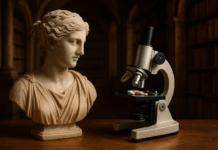A new article published in Integrative Psychological & Behavioral Science features a wide-ranging interview between several Norwegian psychologists and anthropologist Tim Ingold. The conversation is part of the “Return to Reality” research initiative, which challenges the distancing norms of professionalized care and seeks alternatives rooted in presence, responsiveness, and kinship.
Inspired by both philosophy and anthropology, the authors believe Ingold’s approach holds vital lessons for those in the psy-disciplines struggling to meet the ethical and relational demands of their work.
“In the ‘Return to Reality’ research initiative, we seek ways to shift from theoretical models that distance and obscure mental health phenomena and practices as objects of study. Instead, we look for ways, and concepts, that allow us to engage with these phenomena as parts of the world—our common world, the one world in which life is real,” write the authors.
“What Ingold tries to convey through the idea of ‘correspondence,’ as we understand it, is that listening to the world and responding with care, sensitivity, and judgment can help restore our kinship with the earth and its inhabitants. This seems more pertinent than ever in these times of ecological and humanitarian crisis.”
Anthropology can offer different kinds of insights into the human condition from the psychological disciplines, due to its differing areas of focus and modes of observation. Anthropologist Tim Ingold has written several books that, according to the authors of the current paper published in Integrative Psychological and Behavioral Science, hold lessons for psychologists.
The authors of the current paper—Norwegian psychologists Bård Bertelsen, Odd Kenneth Hillesund, Tore Dag Bøe, Per Arne Lidbom, and Rolf Sundet—believe Ingold’s novel ways of considering human experience have much to offer the psychological disciplines.
















“The authors explain” … “they hope that it can inspire people to think differently and more broadly about some of the taken-for-granted assumptions and principles underlying much of what goes on in the psy-disciplines.”
Yes, “when you assume, you make an ass out of you and me.” Please stop assuming you are the judges of all innocent people on the planet, “mental health professionals.” Since you are NOT, God is the judge of all, including you.
Thank you for pointing these rather blatantly obvious sins of the “mental health” industries, Micah.
Report comment
I think the most obvious use of Anthropology in relation to psy-disciplines is forensic investigation of human rights abuses; this would offer something for every kind of sleuth to get their dopamine fix; no humor intended.
Report comment
That is a brilliant idea Carol. I never thought about that per se but the book I mentioned in another post talked of Mary Doria Russell who wrote two syfy novels and her past profession of anthropology there. And yes human rights abuses, oppression and coercion, hierarchy, food and diet and the arts. It is a thought provoking set of novels.
But yes how in terms of archeological history and evolution did we get to the today of today where human rights violations are all over he globe. And strange be sure if one goes back in time to 1947 with the makings of the UN and Human Rights Declaration one would have thought oh humanity you have turned the corner! But no.
Report comment
“According to Ingold, the expert trainer suggested that by noticing and interpreting body language, you can gain insight into what people are really thinking or feeling, as opposed to what they say. For Ingold, this is both intellectually erroneous and deeply unethical:
‘I was furious! What we were being recommended to do was to substitute, for a two-way conversation with a colleague, a form of interrogation in which the niceties of conversation are but a smokescreen for the covert extraction of evidence, which could be used for or against the individual in question in the determination of his or her prospects.'”
You were furious? Join the club.
“For the psy-disciplines, Ingold recommends actually listening to people, taking their own descriptions and explanations seriously, rather than engaging in an interrogation for the hidden meaning of symptoms.”
Almost comical that it takes an entirely different academic discipline to expose the disrespectful attitudes and distancing behaviors routinely practiced by the majority of psychotherapists.
I hope the common courtesy of actually listening to what someone is saying in “therapy” catches on—but I’m not holding my breath as I fear too many therapists are already hopelessly addicted to engaging in covert surveillance.
Report comment
At Min 4:45 – Min 6:40, https://www.youtube.com/watch?v=rYz_ApWYeg0 ,
Howard Schubiner offers one possible explanation for how our notion of “Sin” evolved, for how we (all, I say, even if Howard does not) evolved to be “people-pleasers,” and for how any feelings of shame, “sinfulness,” inadequacy or worthlessness may provoke emotional issues which go on to manifest as “neurosis” (which affects us all), or more acute stress reactions, as well as chronic pain (including neuralgias, migraines and other headaches, TMJ, axial pain, pelvic floor issues etc.), “conversion disorders,” insomnia, fatigue (any or all of which may occur in combination, of course) or a whole host of possible/possibly psychosomatic syndromes such as dry-eye, tinnitus, costrochondritis, IBS (irritable bowel syndrome), GERD, idiopathic epilepsy, frequency of urination (the urge to) and other conditions and- or, at least according to his mentor, John E. Sarno – also including MEH (malignant essential hypertension).
Clearly, this (origin theory) is speculation.
Equally, clearly, I suggest, our most basic impulses – for our survival and for that of our family, clan, tribe, species, planet, may be viewed not so much as genes in headlong, selfish pursuit of survival…as reflecting the nature of a school where souls come to evolve fast both by the very painful lessons of rejection and self-loathing, and the joyful ones of loving.
Such a perspective, I believe, is an ancient one in many if not in all cultures.
It also fully explains “spiritual healing,” the M.O. of Jesus, as reported, and of other shamans/faith healers, and of the placebo and nocebo effects.
https://www.celestialpeach.com/blog/heaven-hell-long-chopsticks-parable
https://en.wikipedia.org/wiki/Allegory_of_the_long_spoons
In rural northwest Ireland, where I lived and worked for 25 years up to 2008, “an meitheal,” or freely given, communal labor to help neighbours with various harvest etc., was still usual.
Strange to say, or perhaps not so strange, but, in all those years, I never either heard of or read of any dispute or falling out about who did what as part of a meitheal, either in Donegal or elsewhere in Ireland. Something about it seemed to unleash the very best in everybody.
Arrived at a difficult, middle-of-the night calving, it was not unusual to find up to a dozen neighbors gathered to assist.
I believe the drive to give, each according to her/his ability/resources, to all according to their need is our most deeply “hardwired” drive, and that the apparently selfish activities of genes is but a symptom of that nature.
You could say that we witness a modern “meitheal” of sorts here on the pages of MIA every day, “therapy” being freely given and received, and that the viciousness and turmoil so evident all over our planet right now are just the last egoic writhings of our so-long thwarted, frustrated, stymied and subverted desires to be of most service to one another. And I do say that!
Thank you, MIA, Micah, Tim and Howard and all who write or read.
Tom.
Report comment